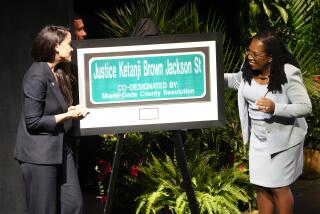Lawmaker wants McKinney’s name off road
- Share via
ATLANTA — In a city where the average commute lasts 31.2 minutes and drivers have no shortage of bottlenecks and wrecks to grumble about, a Republican state lawmaker is exercised about a different kind of transportation issue: Cynthia McKinney Parkway.
Georgia Rep. Len Walker cannot abide driving along a suburban highway honoring Georgia’s former Democratic congresswoman. Each time he catches sight of McKinney’s name on exit ramps on the major interstate encircling Atlanta, he is nettled by thoughts of the combative ex-lawmaker.
So a week after McKinney filed her final congressional measure -- a resolution to impeach President Bush -- Walker pre-filed a bill in the Georgia Legislature to strip McKinney’s name from the street and restore the name Memorial Drive.
“I, along with many Georgians, find it totally inappropriate for Cynthia McKinney’s name to be honored,” Walker said in a telephone interview last week. “She is an embarrassment to the state of Georgia.”
Walker’s bill has slim chance of passing. Georgia law requires that legislators proposing street names must live in the district where the streets are, and Cynthia McKinney Parkway is in DeKalb County, west of Walker’s district.
Walker, though, is confident he can persuade the Republican-dominated Legislature to waive the home-district rule.
His effort has struck a chord among critics of McKinney, who lost her bid for a seventh term in the summer’s Democratic primary after a high-profile altercation with a Capitol Hill police officer.
“Put her name ON the road pavement,” one irate reader of the Atlanta Journal-Constitution proposed in an online forum. Others suggested putting her name on the road to the county landfill.
Yet Walker’s proposal has also prompted charges of racism -- McKinney is black -- and threats of retaliation from African American lawmakers.
McKinney’s supporters argue that the road runs through predominantly African American neighborhoods in Decatur, where McKinney still enjoys considerable support. They say criticism of the road name comes mostly from outsiders who see the signs as they whiz by on the interstate.
In a state crisscrossed by roads named after white Southern men -- including Jefferson Davis, the president of the Confederacy, and Lester Maddox, the onetime segregationist Georgia governor -- many African American legislators and community activists question why a white lawmaker is singling out one of the few roads named after Georgia’s first African American congresswoman.
“This is a witch hunt,” said John Evans, McKinney’s former campaign manager. “This creep doesn’t even live in the district. He’s just another idiotic racist trying to embarrass her.”
Back in 2000, when a portion of Memorial Drive was designated Cynthia McKinney Parkway, many interpreted it as a symbol of Georgia’s progress in race relations. The road connects Stone Mountain, a former stronghold of the Ku Klux Klan, to Atlanta, often called the birthplace of civil rights.
State Sen. Gloria Butler introduced the original legislation to designate a portion of Memorial Drive for McKinney after the congresswoman secured $14 million in federal funds to revitalize the dilapidated street. Butler said she would not consider changing the name.
“Len Walker should name a street in his own district,” she said. “He needs to stay out of DeKalb County.”
The flap is escalating. Last month, another state lawmaker proposed removing the name of McKinney’s father, another controversial former legislator, from a portion of Interstate 285.
Whatever Georgia residents think of McKinney or her father, the dispute has prompted some to suggest that road naming has gotten out of hand. An editorial in the Atlanta Journal-Constitution recently proposed that the state ban naming roads and bridges after any living person.
In the last 70 years, Georgia legislators have named and renamed more than 860 roads and bridges after politicians, preachers, soldiers, civil rights activists, country music stars and even school cafeteria workers. Nearly a third have been named since 2000.
Street and building names are increasingly forums for political expression, said Derek Alderman, a professor of cultural geography at East Carolina University. More than a quarter of the 383 pieces of legislation signed into law during the 109th Congress, he noted, dealt with naming or renaming federal buildings and structures.
“It’s about power,” Alderman said. “Those signs up on the street, they basically create a reminder to people about how their community is situated politically. It’s almost like a daily political lesson.”
More to Read
Sign up for Essential California
The most important California stories and recommendations in your inbox every morning.
You may occasionally receive promotional content from the Los Angeles Times.











